ARTICLE AD BOX

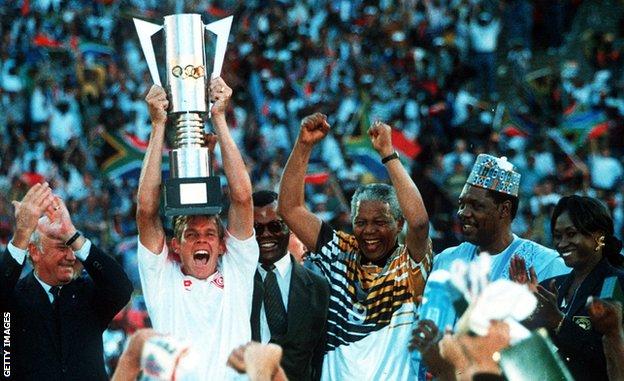 Neil Tovey lifted the 1996 Afcon trophy with Nelson Mandela, the man who made it possible, alongside him
Neil Tovey lifted the 1996 Afcon trophy with Nelson Mandela, the man who made it possible, alongside himThe 1996 Africa Cup of Nations was not supposed to take place in South Africa.
Kenya were the designated hosts but 14 months before the tournament they pulled out, saying it would cost six times more than they had expected. So in November 1994, the Confederation of African Football had to look elsewhere.
Earlier that year, in April, Nelson Mandela had been elected president in the first democratic elections in South Africa's history.
The country's football team had only recently returned to the international stage, being re-admitted to Fifa following the formation of a new multi-racial football association in 1991 as the apartheid system began to be demolished.
South Africa were chosen as replacement hosts. But they were never expected to win it. In fact, early results after their 1991 readmission were so bad they reduced their FA's general secretary Solomon Morewa to tears.
The Africa Cup of Nations (Afcon) would be different. The transformative events of the 1990s that dismantled more than three centuries of white rule in South Africa also swept up football with its unstoppable momentum.
The story of the country's astonishing Rugby World Cup win as hosts in 1995 is well known.
But according to those who represented the young democracy in the Afcon of 1996, this victory had an even bigger impact.

Cameroon were South Africa's first opponents. On 13 January 1996, they met at Soccer City stadium just outside Soweto, where 20 years earlier thousands of students had protested against white-minority rule, with hundreds killed in the police response.
Neil Tovey was 33. A defender with domestic side Kaizer Chiefs, he had made his international debut just after his 30th birthday, in July 1992. That was in his country's first match as a multi-racial, truly national team - which also happened to be against Cameroon and which they won 1-0.
"If prior to the tournament you'd asked the team and me if we could win it, I don't know if we would have said we could," Tovey tells the BBC World Service's World Football podcast.
"The fans and us players didn't have any experience of international tournament football. But progressing through the competition, the country just came alive."
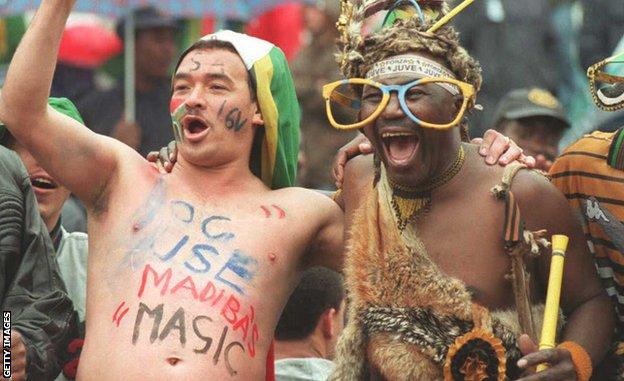 There was one notable absence at Afcon 1996 - defending champions Nigeria boycotted the tournament
There was one notable absence at Afcon 1996 - defending champions Nigeria boycotted the tournamentThe day before their opening match President Mandela, whose clan name was Madiba, made the first of several visits to the team.
Lucas Radebe, then of Leeds United, was another in the South Africa squad. For him, meeting Mandela was almost like a religious experience.
"When we were growing up, we never knew what his face looked like," he says.
"We had an old picture of him when he was young, but when he came to see us in camp, that's when there was 'Madiba Magic'. He had such a great aura. We didn't know what to say.
"That day, if we'd come across Brazil, we would have beaten them. That's how much we were inspired. His presence catapulted us to the highest level, where every game we played, we were playing for Madiba and South Africa."
'Madiba Magic' was the concept of Mandela acting as a good luck charm for sports teams. It was born on 10 May 1994 - the day of Mandela's inauguration - when South Africa beat Zambia for the first time, with the new president in attendance.
It seemed to be working again. Cameroon were beaten 3-0 and the tone was set for what was to come. Leeds' Phil Masinga opened the scoring just 24 hours after landing from England.
According to ex-Charlton striker Shaun Bartlett, as South Africa won their group and moved into the quarter-finals they became known as Madiba's Boys.
"Even now, just talking about the great man Mandela gives me goosebumps," he says. "Every time we met him, shaking his hand, it was like he gave something to you.
"The only downside was that you had to wake up at half past four in the morning, because he was still in that routine from when he was in prison. He woke up early and went for a walk. So we had to wake up to meet him at five."
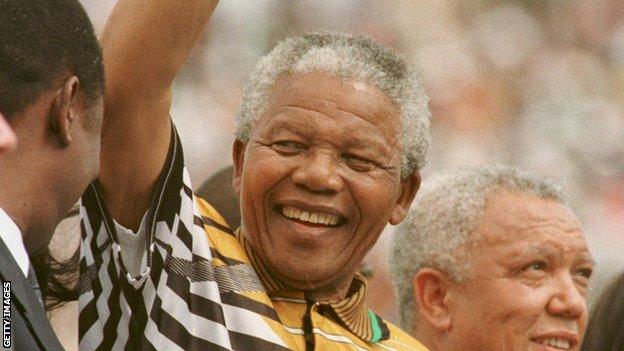 Mandela addressed fans at the opening ceremony, speaking of 'Africa rising'
Mandela addressed fans at the opening ceremony, speaking of 'Africa rising'But South Africa were not crowned African champions just because of a wave of emotion, or because of some kind of otherworldly power. They could also play, and were coached well by Clive Barker.
"He found the qualities in each player and let them do what made them good," says Tovey, who with 29 appearances was his nation's most-capped player.
Going into the tournament, they were on a 13-match unbeaten run which included draws against Germany and Argentina.
Added to that good form was the European experience of Radebe and Phil Masinga at Leeds, and Wolves striker Mark Williams. Defender Mark Fish was being watched by Manchester United and would later that year sign for Lazio, before joining Bolton in 1997.
And after the rugby team's extraordinary victory the previous year, which unified a nation behind a largely white side, there was something to live up to.
"That was one of the goals we spoke about," says Tovey.
"We knew that our role was also to play a part in bringing our country together, and Madiba knew that us doing well would increase the togetherness in the country.
"The euphoria around the rugby team winning was still only 10% of what it could get to if we achieved the same result."
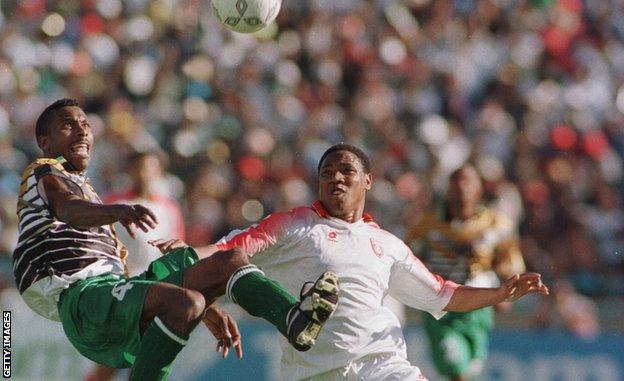 Radebe was told to get back to Leeds straight after the final - he had no time to celebrate
Radebe was told to get back to Leeds straight after the final - he had no time to celebrateA dramatic 2-1 win over Algeria in the quarter-finals, clinched by John 'Shoes' Moshoeu's 86th-minute goal, set up a semi-final against Ghana. They were the tournament favourites, Africa's top-ranked team, and the only one unbeaten in the competition.
Their formidable squad boasted Bayern Munich defender Samuel Kuffour, Torino midfielder Abedi Pele - the father of Andre and Jordan Ayew - and another Leeds player in prolific striker Tony Yeboah.
But the Ghanians were dispatched without ceremony in another 3-0 demolition.
"Ghana was probably one of our best performances ever," says Tovey.
"There was a lot of rivalry between Lucas and Yeboah. All over the field, we won individual match-ups."
News of the victory led all the papers the following day. The finance-oriented Business Day wrote: "By the time South Africa beat Ghana, white suburbia was flocking to the soccer in numbers not seen for 20 years at local and African-based contests."
On the eve of the final, the leading Afrikaans-language daily Beeld's front-page headline was written in Zulu: 'Yebo Bafana Bafana!' (Yeah, The Boys!)
Tunisia were their opponents.
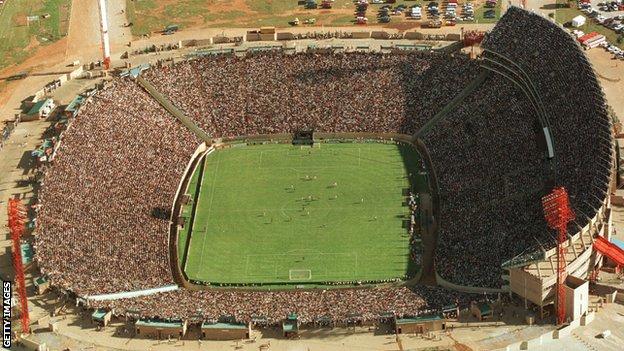 Tunisia were perhaps not among the pre-tournament favourites, but they had impressed on their way to the final
Tunisia were perhaps not among the pre-tournament favourites, but they had impressed on their way to the finalA crowd of 80,000, including President Mandela, Zulu King Goodwill Zwelithini and Brazil legend Pele packed Soccer City three hours before kick-off.
Mandela wore a replica of Neil Tovey's number nine shirt, while many fans had variations of the message 'Make Madiba Magic' painted on their bare chests.
Save for a Bartlett shot that the Tunisia goalkeeper tipped onto the bar, the first half was bogged down in midfield. But just as the match was drifting, midway through the second half Williams, who had come on for Masinga, pounced.
The striker scored twice in two minutes - one a close-range header, the other a left-foot shot - to give South Africa a famous victory. The aftermath felt like boiling ecstasy.
"I still remember it as if it was yesterday," Radebe says. "In the country, everybody's feet were not touching the ground.
"You could hear Soweto. Not the ground, but the fans outside the stadium in the township crying, screaming.
"When we drove away from the stadium, people were just throwing themselves on the ground. Some people carried a shoe, some people brought an actual fish (in homage to 'Shoes' Moshoeu and Mark Fish).
"It was absolutely unbelievable. I think that was the pride of the nation."
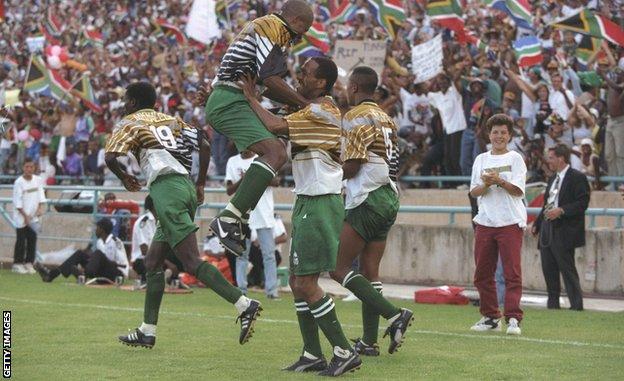 South Africa would go on to qualify for the next two World Cups
South Africa would go on to qualify for the next two World CupsSpeaking before his death in 2015 aged 49 after suffering from stomach cancer, Moshoeu recalled how he broke down in tears when a white fan asked for his autograph.
South Africa still faced significant challenges; sport cannot solve everything. But Mandela recognised its power.
"Sport has the power to change the world," he said. "It has the power to inspire. It has the power to unite people in a way that little else does.
"Sport can create hope where once there was only despair. It is more powerful than government in breaking down racial barriers."
Radebe noticed a shift in dynamics immediately.
"Hearing white people say 'you're my hero, you're my idol' brought so much emotion because I remember what we went through all those years. That was the new South Africa," he says.
"Our minds brightened up. Our eyes were seeing something beyond what we saw before. It was absolutely captivating. Just because of football."
Tovey says that feeling lasted beyond the immediate days of celebration.
"Now there were more whites coming to the ground and watching big club matches and internationals. The support grew and grew through all the cosmopolitan groups.
"It was huge, what we did for the country. About 10 or 12% of the population was interested in the rugby but soccer, it was 90-95 percent. The white farmers even knew about Bafana Bafana now.
"That's not degrading what the rugby players did for the country. They were the first to do it in 1995, and they did a hell of a wonderful job."
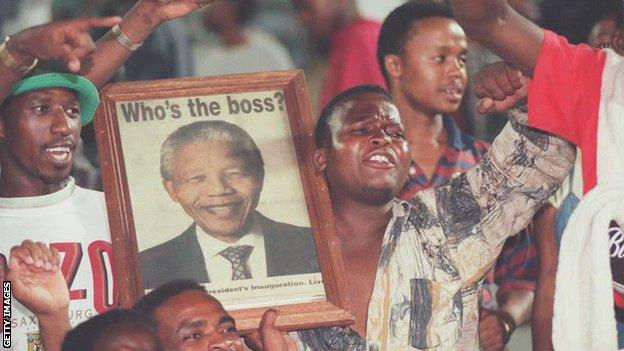 Mandela said: 'Sport can create hope where once there was only despair. It is more powerful than government in breaking down racial barriers'
Mandela said: 'Sport can create hope where once there was only despair. It is more powerful than government in breaking down racial barriers'The football legacy was South Africa's qualification for the next two World Cups. They were runners-up and third in the following two Afcons.
In the corridors of power, then-Fifa president Joao Havelange promised Africa would host the 2006 World Cup. Eventually, in 2010, it happened in South Africa.
As for Tovey, Radebe and Bartlett - they will forever be viewed as champions to the people of their country. Tovey received the trophy from Mandela.
"As a sportsman, you just go about your business. But in the 26 years since I've realised that moment I had with him was very, very special," he says.
"The photograph's on the wall in my bar. It's there in the annals of history.
"We would never have been there if he hadn't come out of jail to get us back into international football."
For Radebe, the immediate legacy was a fine from Leeds.
He says: "After the final, (Leeds manager) Howard (Wilkinson) called and said 'I want you on that plane'. Back to Yorkshire in the cold, miserable winter. Oh my God.
"We were expected to be back the following day. I was fined a week's wages because I got back a day late. When I was in Leeds and I saw on TV the open-top bus tour with the trophy, to be honest it was heartbreaking.
"The players went to Sun City with their wives and girlfriends, and I'm playing games in Leeds in February. The weather was the worst ever. It was terrible.
"I was waiting for the summer to come at the end of the season so I could go home and have my piece of the celebrations."
The Africa Cup of Nations victory was not the end of Bartlett's association with Mandela, however. 'Madiba' was a guest at his wedding.
"We never told anyone he was coming. Only my wife and I knew about it. I think I had more butterflies than when I asked my missus to get married," he says.
"She was there at 3 o'clock, he was sitting down at 2:45 because he didn't want to upstage her. That was the man, always doing things with integrity, and those are small things that I can take into my life.
"He's definitely in the photos. You can't tell people he came to your wedding and have no proof."

 2 years ago
54
2 years ago
54
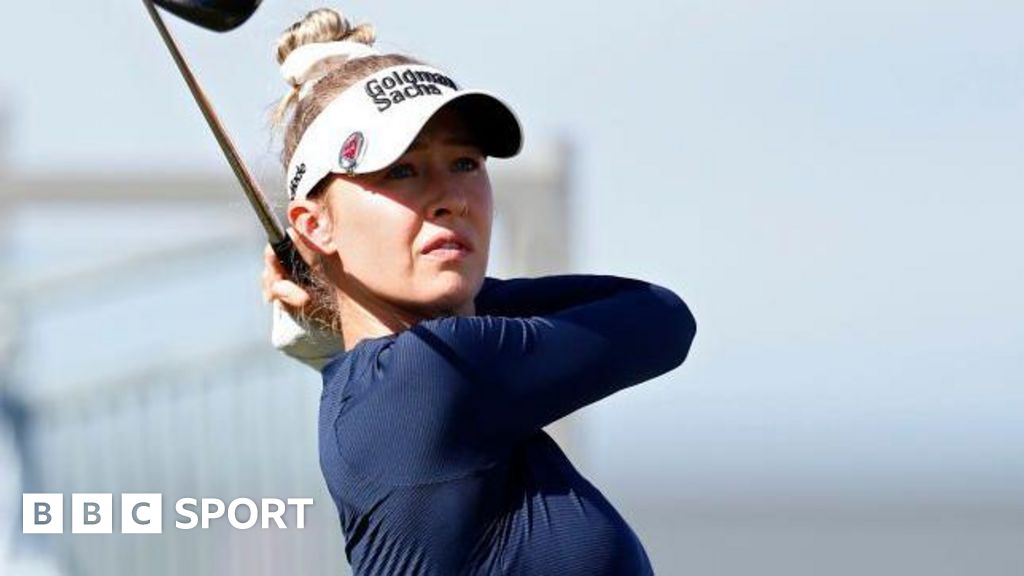
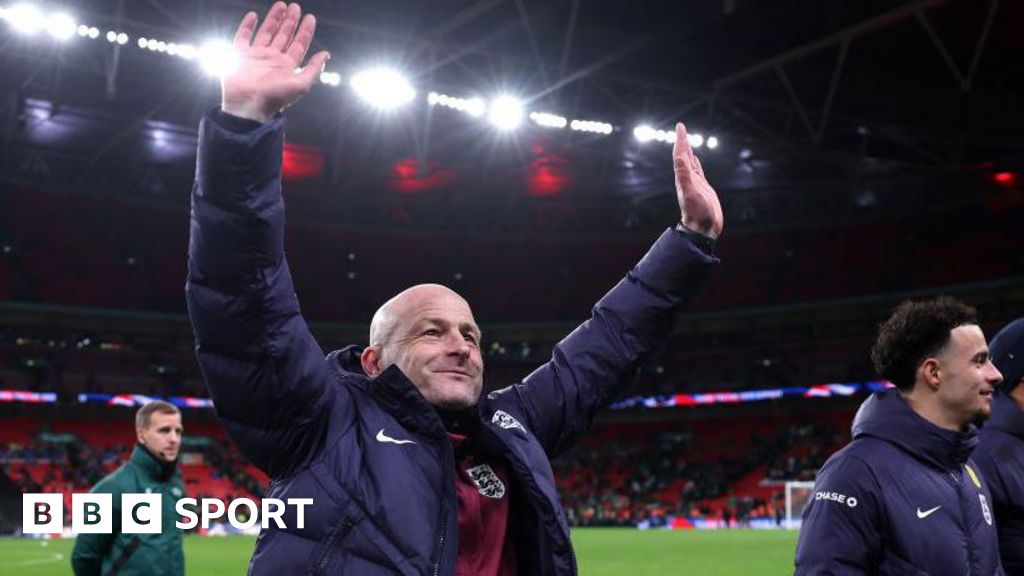
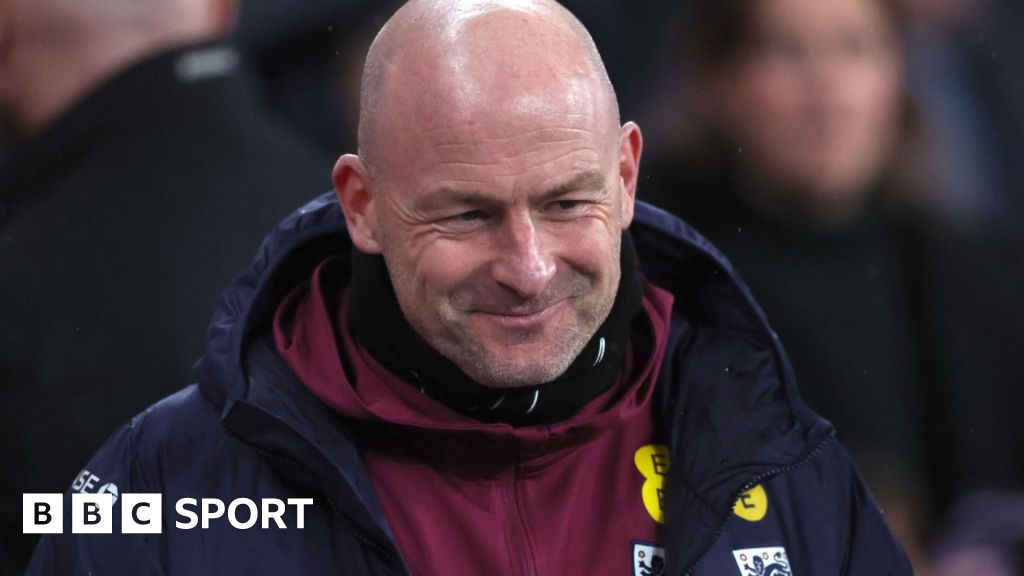





 English (US)
English (US)